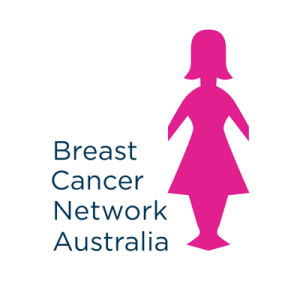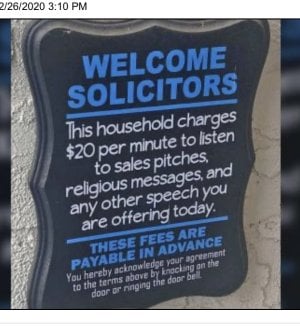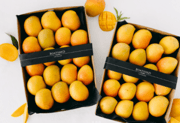Beware, homeowners! Deceptive door-knockers falsely soliciting for cancer funds
By
Seia Ibanez
- Replies 14
In the quiet suburbs of Adelaide’s west, a new threat has emerged, not from the internet or overseas, but right at the doorstep of unsuspecting homeowners.
Unscrupulous scammers have taken to door-knocking, exploiting the goodwill of the community under the guise of collecting donations for alleged cancer research.
Ashlee Megan, a resident of West Beach, shared her unsettling encounter with two young men in their 20s who knocked on her door in November 2023.
Dressed in pink uniforms, carrying ID cards and paperwork, they seemed legitimate at first glance.

They asked Megan if she knew anyone diagnosed with cancer and requested a monthly donation of under $100 to their organisation.
However, when Megan declined to provide her credit card details, the men became forceful, insisting she inspect their ID cards.
This raised Megan's suspicions, and she refused to comply.
She wasn't alone in her experience; other residents in Adelaide's western suburbs reported similar encounters, leading them to believe that the door knockers might be from Breast Cancer Network Australia (BCNA).
However, BCNA confirmed that it does not engage in door-to-door fundraising, and the individuals seeking donations were not associated with them.
It was previously confirmed in a statement that this scam happens in other parts of the country, like Queensland and ACT.
'It’s recently come to our attention [that there are] people claiming to represent Breast Cancer Network Australia (BCNA) knocking on doors in South Australia and asking for donations,' the company stated.
'Throughout the year, fundraising activities for our network do vary, however, in line with BCNA policy, this does not involve door-to-door activity.'
‘There are some charities that do face-to-face fundraising, so it is recommended that you ask for proper ID, including a photo from anyone requesting donations for a charity.’
The Australian Competition and Consumer Commission (ACCC) had previously warned of similar scams in 2014, where companies posed as registered charities to solicit donations.
The National Breast Cancer Foundation, which does engage in door-knocking activities, advised people always to check the ID of volunteers and ask for a receipt with the charity's Australian Business Number (ABN).
Meanwhile, South Australia Police urged residents to report any suspicious activity, providing descriptions of the individuals, any vehicles, and their direction of travel.
'Legitimate volunteers will have proper identification, including a photo which clearly identifies them as being a volunteer for that charity,' they said.
'If in doubt, contact the charity directly, using a number that you look up, not one provided by the “volunteer”.’
Megan's experience is a stark reminder of the audacity of scammers and the importance of vigilance.
'It’s a bit confronting to think they’ve been knocking on my door. You always imagine scammers being someone over the internet or someone overseas trying to steal your money, not someone standing in front of you,' Megan said.
‘They don’t care about the person they’re taking from. It’s a different mentality.’
Official data revealed that Australians lost a staggering $3.1 billion to scams in 2022, with a significant portion of these losses attributed to fake charity appeals.
Scammers are known to exploit people's genuine concern for others in their community, as was the case during the Black Summer bushfires. The surge of fake bushfire charities preyed upon Australians' goodwill and willingness to help out their fellow citizens.
You can read more about it here.


Have you encountered a door-to-door scam? Share your experiences and tips in the comments below. Let's help each other stay safe!
Unscrupulous scammers have taken to door-knocking, exploiting the goodwill of the community under the guise of collecting donations for alleged cancer research.
Ashlee Megan, a resident of West Beach, shared her unsettling encounter with two young men in their 20s who knocked on her door in November 2023.
Dressed in pink uniforms, carrying ID cards and paperwork, they seemed legitimate at first glance.

Scammers were pretending to be members of the BCNA to falsely solicit funds. Credit: Breast Cancer Network Australia Facebook
They asked Megan if she knew anyone diagnosed with cancer and requested a monthly donation of under $100 to their organisation.
However, when Megan declined to provide her credit card details, the men became forceful, insisting she inspect their ID cards.
This raised Megan's suspicions, and she refused to comply.
She wasn't alone in her experience; other residents in Adelaide's western suburbs reported similar encounters, leading them to believe that the door knockers might be from Breast Cancer Network Australia (BCNA).
However, BCNA confirmed that it does not engage in door-to-door fundraising, and the individuals seeking donations were not associated with them.
It was previously confirmed in a statement that this scam happens in other parts of the country, like Queensland and ACT.
'It’s recently come to our attention [that there are] people claiming to represent Breast Cancer Network Australia (BCNA) knocking on doors in South Australia and asking for donations,' the company stated.
'Throughout the year, fundraising activities for our network do vary, however, in line with BCNA policy, this does not involve door-to-door activity.'
‘There are some charities that do face-to-face fundraising, so it is recommended that you ask for proper ID, including a photo from anyone requesting donations for a charity.’
The Australian Competition and Consumer Commission (ACCC) had previously warned of similar scams in 2014, where companies posed as registered charities to solicit donations.
The National Breast Cancer Foundation, which does engage in door-knocking activities, advised people always to check the ID of volunteers and ask for a receipt with the charity's Australian Business Number (ABN).
Meanwhile, South Australia Police urged residents to report any suspicious activity, providing descriptions of the individuals, any vehicles, and their direction of travel.
'Legitimate volunteers will have proper identification, including a photo which clearly identifies them as being a volunteer for that charity,' they said.
'If in doubt, contact the charity directly, using a number that you look up, not one provided by the “volunteer”.’
Megan's experience is a stark reminder of the audacity of scammers and the importance of vigilance.
'It’s a bit confronting to think they’ve been knocking on my door. You always imagine scammers being someone over the internet or someone overseas trying to steal your money, not someone standing in front of you,' Megan said.
‘They don’t care about the person they’re taking from. It’s a different mentality.’
Official data revealed that Australians lost a staggering $3.1 billion to scams in 2022, with a significant portion of these losses attributed to fake charity appeals.
Scammers are known to exploit people's genuine concern for others in their community, as was the case during the Black Summer bushfires. The surge of fake bushfire charities preyed upon Australians' goodwill and willingness to help out their fellow citizens.
You can read more about it here.
Tip
If you or someone else was scammed, notify your bank immediately. You can also report the scam to Scamwatch here.
You can also head over to our Scam Watch forum to stay updated with the latest tricks scammers use to deceive people out of their money and sensitive details.
You can also head over to our Scam Watch forum to stay updated with the latest tricks scammers use to deceive people out of their money and sensitive details.
Key Takeaways
- Adelaide residents have reported scammers door-knocking and requesting credit card details for supposed donations to breast cancer research.
- The scammers, dressed in pink and equipped with ID cards, falsely claimed to represent Breast Cancer Network Australia (BCNA), which has confirmed it does not engage in door-to-door fundraising.
- The National Breast Cancer Foundation advised checking the ID of volunteers and always asking for a receipt with the charity's ABN to avoid falling for scams.
- South Australia Police urged residents to be vigilant, verify the legitimacy of charity volunteers by contacting the charity directly, and report any suspicious activity to the police.
Last edited:








